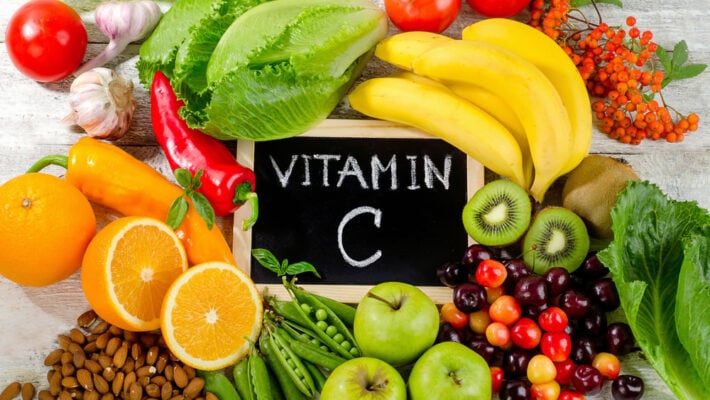
The Importance of Vitamin C in Your Daily Life
Of the seemingly endless supplements in the nutrition world, none is more common and misunderstood than vitamin C. Let’s take a closer look at vitamin C and the role it plays in maintaining optimal wellness.
What is Vitamin C?
Alternately known as ascorbic acid, vitamin C is an essential nutrient, which means that your body is incapable of producing it on its own. The only way to get vitamin C is through diet, either from dietary supplements or foods naturally rich in vitamin C. Ascorbic acid is also water-soluble, meaning it dissolves in water. This basically means that once you have reached your body’s vitamin C threshold, any excess is excreted from the body via urine and sweat.
Vitamin C (ascorbic acid) is a water-soluble vitamin essential to your health. Unlike most other animals, humans are unable to synthesize vitamin C within themselves, meaning that it must be obtained through diet or supplementation.
The Benefits of Vitamin C
Vitamin C offers a wealth of benefits to nearly all tissues and organ systems. Here are some of its most prominent health benefits:
Antioxidant Properties
Vitamin C is known to act as a powerful antioxidant. Your cells naturally undergo oxidation from contact with oxygen, and one of the byproducts of this reaction is free radicals. Free radicals may cause a great deal of harm and damage to cells, tissue, and even your DNA. As an antioxidant, vitamin C can effectively neutralize free radicals to prevent cellular damage, support immune system, and protect your body.
Collagen
Vitamin C is necessary for the production of collagen, a protein that is essential to all connective tissues, including skin, hair, muscles, and tendons. Collagen helps your skin look young and keeps your tissues strong.
Digestive Health
Vitamin C’s antioxidant properties make it a powerful anti-inflammatory. The vitamin’s collagen-building potential also makes it essential for supporting the tissues that make up the lining of the stomach and intestines.
Iron Absorption
Iron is a mineral that performs a variety of functions. It is mainly known as a component of hemoglobin, the protein in red blood cells responsible for carrying oxygen throughout the body. Vitamin C naturally improves absorption of this mineral and converts iron into a more easily absorbed form, ensuring that your tissues and organs receive plenty of oxygen.
Promotes Immune Health
Perhaps vitamin C’s most well-known benefit is its positive effect on the immune system. Along with its antioxidant properties, vitamin C has been shown to encourage the production of lymphocytes and phagocytes.
Mood
Studies suggest that vitamin C plays a role in the production of several mood-regulating neurotransmitters, including dopamine, norepinephrine, and epinephrine. This explains why lower than normal vitamin C levels may result in feelings general irritability, though more research is necessary to understand vitamin C’s role in mood and mental health.
Sources of Vitamin C
You can get vitamin C from supplements, but it is readily available in certain foods. Oranges and citrus fruits are perhaps the most popular sources of vitamin C, but you can also get the vitamin from:
- Red and green peppers
- Kiwis
- Broccoli
- Strawberries
- Brussels sprouts
- Tomatoes
- Spinach
Recommended Daily Intake
Intake recommendations, as provided by the Food and Nutrition Board, vary by age and gender. Generally, adult men, age 19 or older, should get about 90 milligrams of vitamin C per day. Women 19 or older should get about 75 milligrams. However, pregnant women should take about 85 milligrams per day, while women who are breastfeeding should get about 120 milligrams per day.
Too Much and Too Little
There is some limited evidence showing potential concerns with a daily intake in excess of 1,000 mg. High daily doses of the vitamin can also prevent you from getting the full benefits of endurance exercises.
Too much vitamin C can also prevent certain medications from functioning properly. When combined with higher doses of Tylenol (acetaminophen), vitamin C can increase your risk of liver damage. Vitamin C can also interfere with results for cholesterol and blood sugar tests.
Furthermore, many people mistakenly think of vitamin C as a cold remedy. While ascorbic acid can potentially help support your immune system, it can only do so over a long period of taking the vitamin consistently. Suddenly flooding your body with vitamin C at the first sign of a cold generally won’t have any significant health effect. At best, your body will excrete the excess vitamin out of your system (generally at doses above 400 mg). At worst, you may induce an upset stomach due to the increased acidity and diarrhea, on top of your growing cold.
Taking too much vitamin C should not pose a problem for most people, especially if spread out over the course of a day (i.e., not all at once). As mentioned, vitamin C is a water-soluble nutrient, so any excess will leave your body naturally. Some people who do take megadoses of vitamin C may experience:
- Diarrhea
- Nausea
- Abdominal cramps
- Gastrointestinal discomfort
- Headaches
- Insomnia
Vitamin C deficiencies are relatively rare given the availability of fresh produce and the fact that many modern foods are often enriched with vitamin C. If you are eating a diverse diet and in otherwise good health, you shouldn’t have any problems. Remember that vitamin C plays an integral role in the synthesis of collagen. Without vitamin C, you are unable to create enough collagen to maintain healthy skin or even heal wounds adequately.
If you choose to enhance your diet with a vitamin C supplement, be sure to select a supplement that offers liposomal delivery. Liposomal delivery (LD) ensures that more vitamin C actually reaches the intestines and is absorbed into the bloodstream. And remember that although LD increases the bioavailability of a supplement, fresh fruits and vegetables provide more health benefits than just the vitamins and minerals that they contain.



